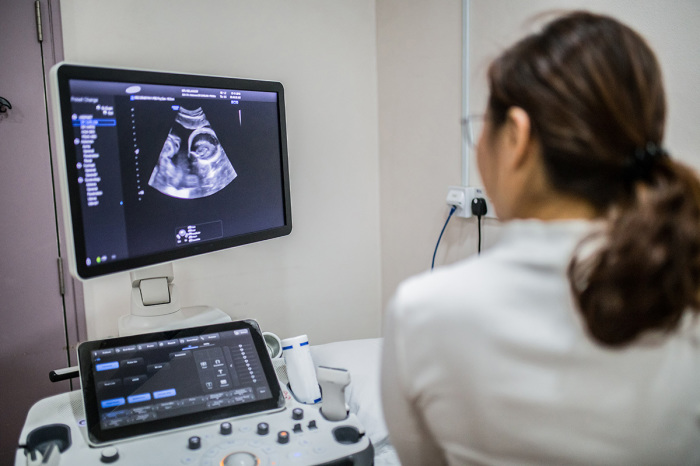Activists blame abortion restriction for pregnant mother's death; pro-lifer responds

A pro-life doctor has responded to abortion proponents' assertions that Texas' abortion restrictions played a role in the death of a woman who died following complications from a high-risk pregnancy two weeks after the U.S. Supreme Court reversed Roe v. Wade.
As The New Yorker reported last Monday, Yeniifer "Yeni" Alvarez-Estrada Glick came to the United States at the age of 3 in 1998. She later met Andrew Glick, an army reserve specialist, whom she married in 2021.
The nonprofit group Abortion Access Front claimed that the state's abortion restrictions were responsible for Glick's death in June 2022. In a Tuesday X post, the group argued that the "anti-abortion ecosystem is designed to kill people."
Planned Parenthood Texas Votes, the political arm of the Planned Parenthood affiliates in Texas, also blamed Glick's death on Texas' abortion restrictions in a Wednesday X post. The advocacy group argued that the mother's death is an example of the "reality" Texans face as a result of Roe's reversal and, before that, Texas' heartbeat abortion ban, which banned abortion as early as six weeks gestation.
"Yeni could still be here today if it wasn't for the dangerous abortion landscape in our state," Planned Parenthood Texas Votes stated.
Dr. Christina Francis, board-certified OB-GYN and CEO of the American Association of Pro-Life Obstetricians and Gynecologists, told The Christian Post that the deaths of Glick and her daughter Selene are "immeasurably tragic."
But the pro-life doctor contends that this outcome could have been avoided if Glick had access to high-quality care before and during her pregnancy. Francis highlighted factors that likely contributed to the woman's death, including the lack of resources at the local hospital, the high cost of Glick's diabetes medication, which deterred her from taking it, and the premature discharge from the Austin hospital.
"These are circumstances we see throughout our country, leading to our worst maternal mortality rates in decades — and these rates are from before Texas' pro-life protections went into place and before Dobbs."
According to the Center for Healthcare Quality and Payment Reform, fewer than 45% of rural hospitals in the United States offer labor and delivery services. From 2021 to 2022, more than half of small rural maternity care hospitals lost money, and, in most cases, these hospitals were forced to eliminate maternity care.
As a result, community members are forced to travel more than 40 minutes to reach a hospital with obstetric services, according to the report.
"The narrative that promotes induced abortion as a Band-Aid solution to the complex factors contributing to our nation's maternal mortality crisis does nothing to improve women's health and, in fact, actively endangers women as it prevents us from addressing the real, and often preventable, causes," Francis asserted.
"Yeni and Selene deserved access to a well-resourced medical team that were equipped to adequately care for them," she continued. "The tragedy of their deaths should spur us to work towards real solutions, not be used to advance a radical political agenda."
A month after her wedding, Glick learned she was pregnant. While she had been diagnosed with some health issues that would make the pregnancy high-risk, Glick felt joy at the news, according to The New Yorker.
The mother learned in her mid-20s that she had hypertension and diabetes. She also became ill after COVID-19 peaked in Luling, the town where her family settled.
Another issue that made the pregnancy high-risk was Glick's weight, which, as The New Yorker reported, "rarely dipped below [260] pounds." She experienced her first complication at seven weeks, and the emergency room referred to her case as a "threatened miscarriage."
Glick's blood pressure also spiked to 185/98, according to the report. The emergency room referred Glick to Dr. Jessica Mueller, an OB-GYN, who warned that her hypertension appeared severe and that she should be admitted to a hospital.
Due to financial concerns, Mueller was unable to persuade Glick to go to the hospital, as the mother had already been forced to pay for the visit with the OB-GYN out of pocket. Glick also hadn't received a response after applying for health coverage as an undocumented immigrant, according to The New Yorker.
Mueller counseled Glick about potential health risks, and she advised her patient against skipping doses of her blood pressure medication. Glick sometimes avoided taking her medication because the drugs made her nauseated and sleepy.
The doctor warned Glick that not taking her medication put her at risk of a heart attack, stroke or a miscarriage. Mueller would then counsel Glick several more times to ensure her patient was stable.
"Medical records do not suggest any discussion of the fact that an abortion could have alleviated the additional strain that the pregnancy placed on her heart," The New Yorker reported.
When she was around 22 weeks pregnant, Glick went to the emergency room while suffering from shortness of breath, and her blood pressure was 205/129. Glick developed pulmonary edema, which, according to The Mayo Clinic, is caused by too much fluid in the lungs.
The threat to her health meant Glick needed to be transferred out of Luling. However, a helicopter could not take Glick to a larger hospital due to poor weather. Instead, Glick was taken to a specialist at a medical center in Austin.
When she arrived, The New Yorker cited records that indicated Glick was at "high risk for clinical decompensation/death." There were concerns that she may have pre-eclampsia, which typically requires early delivery to reduce the risk of complications; however, it was later found that Glick did not have pre-eclampsia.
The mother was eventually discharged and provided with an adjusted dose of hypertension medication. Glick's family wondered if she would have been permitted to stay longer if she had insurance, according to The New Yorker.
In May, Glick started experiencing shortness of breath once again, and she went to see Mueller, who instructed the mother to return with a urine sample the next day. While Glick sensed something was wrong, the doctors did not appear to be able to diagnose the problem, and each visit was expensive.
Even though her shortness of breath continued, The New Yorker noted that records indicate Glick did not visit the doctor again. She also stopped taking the medication prescribed to her, and she did not seek care again until July. By that time, her symptoms intensified, and her blood pressure was 213/146.
The paramedics who arrived planned to take Glick to the hospital in Luling, which was five minutes away, and then transfer her via helicopter to another hospital. There appeared to be confusion about how to treat Glick, leading to a two-hour delay.
By the time Glick arrived at the hospital, the helicopter was still en route, and while doctors were prepared to treat her, Glick did not have a pulse. As The New Yorker noted, specialists believe that a C-section within four minutes of the mother's death can revive the mother and improve the infant's chances of survival.
It was past the four-minute mark by the time a doctor made an incision, and at 31 weeks, Glick's daughter Selene also died.
The cause of death listed for Glick was "Hypertensive cardiovascular disease associated with morbid obesity," with "pregnancy" listed as a contributing factor.
Samantha Kamman is a reporter for The Christian Post. She can be reached at: samantha.kamman@christianpost.com. Follow her on Twitter: @Samantha_Kamman





























